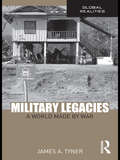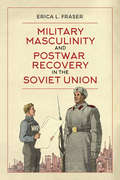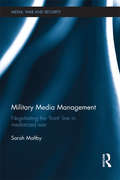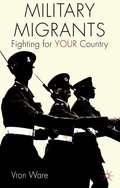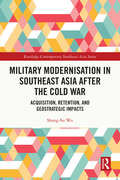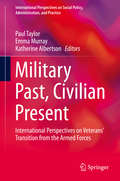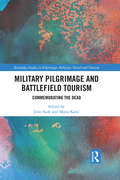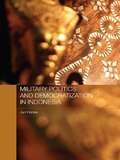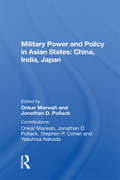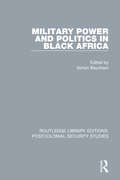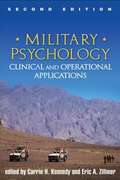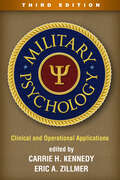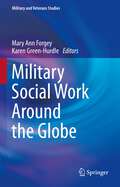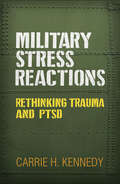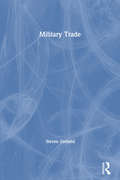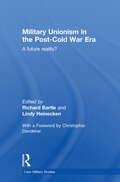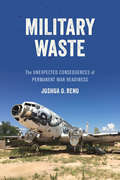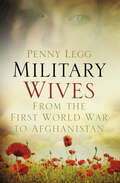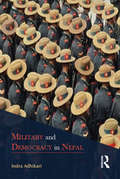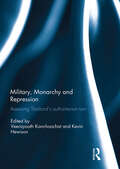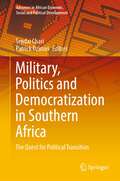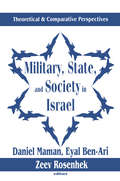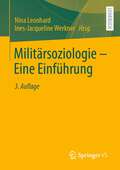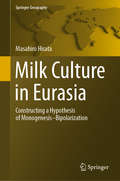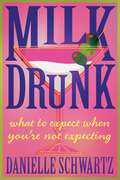- Table View
- List View
Military Legacies: A World Made By War
by James A. TynerLandmines, cluster-bombs, chemical pollutants, and other remnants of war continue to cause death to humans and damage to the environment long after the guns have fallen silent. From the jungles of Vietnam to the arctic tundra of Russia, no region has escaped the legacy of warfare. To understand the legacy of modern militarism, this book presents an overview of post-conflict societies, with an emphasis on the human toll exacted by modern warfare.
Military Masculinity and Postwar Recovery in the Soviet Union
by Erica L. FraserCatastrophic wartime casualties and postwar discomfort with the successes of women who had served in combat roles combined to shatter prewar ideals about what service meant for Soviet masculine identity. The soldier had to be re-imagined and resold to a public that had just emerged from the Second World War, and a younger generation suspicious of state control. In doing so, Soviet military culture wrote women out and attempted to re-establish soldiering as the premier form of masculinity in society. Military Masculinity and Postwar Recovery in the Soviet Union combines textual and visual analysis, as well as archival research to highlight the multiple narratives that contributed to rebuilding military identities. Each chapter visits a particular site of this reconstruction, including debates about conscription and evasion, appropriate role models for cadets, misogynist military imagery in cartoons, the fraught militarized workplaces of nuclear physicists, and the first cohort of cosmonauts, who represented the completion of the project to rebuild militarized masculinity.
Military Media Management: Negotiating the 'Front' Line in Mediatized War (Media, War and Security)
by Sarah MaltbyThis book examines the practices of actors involved in the media reportage of war, and the ways in which these practices may influence the conduct of modern military operations. War is a complex phenomenon which raises numerous questions about the organization of society that continue to challenge all those involved in its study. Increasingly, this includes the need to engage theoretically and empirically with the progressive collapse between the ways in which wars are conducted and the manner in which they are reported in the media. Drawing on the work of Erving Goffman, Military Media Management offers a distinctly new approach to our appreciation of the dynamic relationship between war and media; one that is fundamentally a product of social relations between those engaged in reporting war, and those conducting war campaigns. By exploring how and why the military manage information in particular ways, the text succeeds in providing a framework through which wider sociological investigation of this relationship can be understood. This book will be of much interest to students of military and security studies, media studies, war and conflict studies and IR in general.
Military Migrants
by Vron WareThis is the first book to examine "migrant-soldiers' in the British army and places the phenomenon of Britain's multicultural army in relation to British culture, history and nationalism. It also explores the impact of war on UK society during the 21st Century
Military Modernisation in Southeast Asia after the Cold War: Acquisition, Retention, and Geostrategic Impacts (Routledge Contemporary Southeast Asia Series)
by Shang-Su WuSoutheast Asian countries represent a wide range of approaches to military modernisation due to their great diversity in politics, economies, geography and other factors. Bounded by the Pacific and Indian Oceans and located between China and India is the setting for the geostrategic impacts of military modernisation in Southeast Asian countries.Differing from previous research focused on military acquisition, this book additionally covers retention of assets and carefully examines the ageing issues that affect readiness and capabilities. In doing so, it provides a comprehensive view of military modernisation. This book also compares each country’s situation in the region in terms of military strength and security challenges to elaborate on the geostrategic impacts of military modernisation. The ten cases of military modernisation in the post-Cold War context provide rich content for readers to explore the evolution of military modernisation in developing countries after 1991.This book sheds light on security studies of Southeast Asia and is a useful resource for academic researchers, policy-makers and defence practitioners.
Military Past, Civilian Present: International Perspectives on Veterans' Transition from the Armed Forces (International Perspectives on Social Policy, Administration, and Practice)
by Paul Taylor Emma Murray Katherine AlbertsonThis edited book presents a synthesis of current international knowledge on the topic of military veteran transition to civilian life. Understanding the transition of individuals from military institutions to civilian life is of great importance. The essential elements of transition support are currently widely debated in order to assess current practice and potential shortcomings in the intention to improve health, welfare and social outcomes for military veterans. This text links original research and critical commentary to public policy and practice in the area of veteran transition. Doing so through a collection of international perspectives assists in locating continuity and difference between strategies, agendas and the realities of what is actually known of the veteran’s experience. Chapters in this text examine the subject of transition along lines of enquiry that focus in on themes such as social justice, veteran identity and developments in transition agendas. Globally, many veterans face complex social issues such as low income, barriers to employment, and problems of health and welfare. Chapters take stock of the real-world issues affecting veterans and at the same time casts a critical eye over the limitations in accessing, or denial of access to opportunities, support and remedy. The veteran identity is an important dimension of enquiry here. This book looks at the relational factors between the veteran and the public, the creation of a master status and the challenges faced by veterans in transitioning into a cultural context that is saturated with imagery of what a veteran ‘is’. Chapters also seek to pose recommendations as to how the policy and practice agenda that surrounds veterans and the bridging of the gap between military and civilian life may be developed. Here authors point towards the value of knowledge, research and analysis that is underpinned by participatory strategies with veterans themselves. For example, seeking to establish lines of enquiry that value the voice of veterans as an ongoing and iterative dimension of developing understanding.
Military Pilgrimage and Battlefield Tourism: Commemorating the Dead (Routledge Studies in Pilgrimage, Religious Travel and Tourism)
by John Eade Mario Kati 263Military Pilgrimage and Battlefield Tourism is the first volume to bring together a detailed analysis of professional military pilgrimage with other forms of commemorating military conflict. The volume looks beyond the discussion of battlefield tourism undertaken primarily by civilians which has dominated research until now through an analysis of the relationship between religious, military and civilian participants. Drawing on a comparative approach towards what has mostly been categorised as secular pilgrimage, dark tourism/thanatourism, military and religious tourism, and re-enactment, the contributors explore the varied ways in which memory, material culture and rituals are performed at particular places. The volume also engages with the debate about the extent to which western definitions of pilgrimage and tourism, as well as such related terms as religion, sacred and secular, can be applied in non-western contexts.
Military Politics and Democratization in Indonesia (Rethinking Southeast Asia)
by Jun HonnaThe military have had a key role to play in Indonesia's recent history and may well have a decisive role to play in her future. This book looks at the role of the military in the downfall of Suharto and their ongoing influence on the succeeding governments of B.J. Habibie and Abdurrahman Wahid. The author also examines such key features as human rights, reconciliation, civic-military discourse and ongoing security dilemmas. The book is unique in providing the best overview of the role of the military in the world's fourth most populous nation.
Military Power And Policy In Asian States: China, India, Japan (Westview Special Studies On South And Southeast Asia)
by Onkar MarwahThis study challenges the belief that the security concerns and strategic objectives of lesser states are dependent on the dominant power alliances and on assessments by major powers of the prospects for peace or war. Focusing on the views of security and military power adopted by elites in China, India, and Japan, the contributors point out that e
Military Power and Politics in Black Africa
by Simon BaynhamFirst published in 1986, Military Power and Politics in Black Africa explores many themes that concerned military power and politics in sub-Saharan Africa at the time of publication. Adopting a thematic approach, the book considers the nature of both intervention and disengagement and looks at the relationship between civilian and military institutions. The final chapters put forward arguments for the importance of foreign intervention in the politics and civil-military relations of African states.
Military Psychology, Second Edition
by Eric A. Zillmer Carrie KennedyWidely regarded as the authoritative reference in the field, this book comprehensively explores the psychological needs of today's service members and how to meet them effectively. Expert contributors review best practices for conducting fitness-for-duty evaluations and other types of assessments, treating frequently encountered clinical problems, responding to disasters, and promoting the health and well-being of all personnel. The book also examines the role of mental health professionals in enhancing operational readiness, with chapters on crisis and hostage negotiation, understanding terrorists, and more. New to This Edition The latest scientific knowledge, clinical interventions, and training recommendations. Chapter on acute combat stress. Chapter on post-deployment problems, including PTSD and depression. Chapter on military psychology ethics. Coverage of blast concussion screening and evaluation.
Military Psychology, Third Edition: Clinical and Operational Applications
by Carrie H. Kennedy and Eric A. ZillmerWith more than 60% new material reflecting advances in evidence-based treatments and the evolving roles of military mental health providers, the authoritative resource in the field is now in a significantly revised third edition. The volume provides research-based roadmaps for prevention and intervention with service members and veterans in a wide range of settings. Up-to-date information about military procedures and guidelines is included throughout. Grounded in current knowledge about stress and resilience, chapters describe best practices in treating such challenges as depression, anxiety disorders, posttraumatic stress disorder, and substance use disorders. Also addressed are operational functions of psychologists in personnel assessment and selection, counterintelligence, and other areas. New to This Edition *Chapters on new topics: the spectrum of military stress reactions, concussion management, military sexual assault, embedded/expeditionary psychological practice, and security clearance evaluations. *Fully rewritten chapters on evidence-based treatments, behavioral health in primary care, and disaster mental health. *Incorporates major shifts in how and where military mental health services are delivered.
Military Social Work Around the Globe (Military and Veterans Studies)
by Mary Ann Forgey Karen Green-HurdleThis is the first book to focus on the scope of social work practice within military settings from an international perspective, and therefore addresses what has been a significant gap in the literature. Given the critical support needs of military personnel and their families worldwide, and the expanding role of social work in responding to these needs, this book offers a comprehensive global understanding of the common military social work (MilSW) practices with active duty military service members and their families, as well as the forms of practice and approaches that are unique, or potentially transferable across nations.Based on a systematic inquiry conducted by the Editors, there are at least 25 countries that have social workers working directly within their country’s military in either a civilian or uniformed capacity, or both. This book includes contributions from experts in Australia, Canada, Denmark, Finland, Ireland, Israel, the Netherlands, New Zealand, South Africa, the UK, and the USA, who describe various aspects of the MilSW role within their country and the research that informs what military social workers do. The MilSW similarities and differences among these countries are highlighted, including developmental milestones, practice settings, practice orientation and approach, ethical dilemmas, military to veteran transition support, and past and current challenges. Experts from countries that do not yet have MilSW but are interested in developing it (Japan, Ukraine) or are in the process of establishing this area of practice (Slovakia), also contribute chapters about these developments and the evidence base that supports this direction.Military Social Work Around the Globe is a valuable resource for social work programs and essential reading for instructors and students in MilSW electives and specializations. It is also pertinent reading for occupational social work and international social work courses. In addition, this book is an important source of information for military social workers who would like to gain insights into existing programs and the possibilities for international collaboration, and for countries interested in developing MilSW.
Military Stress Reactions: Rethinking Trauma and PTSD
by Carrie H. KennedyMany people--including some mental health professionals and service members themselves--have the misconception that military deployment is highly likely to cause posttraumatic stress disorder (PTSD). This book gives practitioners a more nuanced understanding of military stress reactions and related mental health concerns, from transient adjustment problems to clinical disorders. Drawing on expert knowledge of military environments and culture, Carrie H. Kennedy provides vital guidance for evidence-based assessment, intervention, and prevention. Kennedy emphasizes that overdependence on the diagnosis of PTSD can lead to suboptimal care, and shows how to tailor treatment to each service member's or veteran's needs. A crucial addition to any practitioner's library, the book is illustrated with numerous case vignettes.
Military Trade
by Steven ZeelandA same-sex attraction for soldiers and sailors spans the globe and predates the term “homosexual” by several thousand years. But these days “military chasers” are likely to be seen as doubly incorrect. Most are gay men who pursue straight men. And, many of them do it in public. What continues to motivate so many men to brave arrest, violence, and the scorn of gay leaders who condemn any non-gay homosexual desire as “internalized homophobia”?In Military Trade (now updated to include an expanded photo insert!), Steven Zeeland, author of Sailors and Sexual Identity, The Masculine Marine, and Barrack Buddies and Soldier Lovers, brings together an edgy, enlightening, and richly entertaining collection of voices with a passion for servicemen, including: a TV talk-show host who pimped Marines to Hollywood stars a heavy metal superstar who dreams of being reincarnated as a Marine boot a women “trapped in a gay man’s body” who seduces Marines online then dominates them in person with strap-on dildos a former Force Recon Marine who complains of being chased by civilians but is now a Marine-chaser himselfBy turns steamy, hilarious, appalling, and deeply moving, Military Trade challenges assumptions about both chaser and chased and poses pointed questions about the wisdom of those who seek to divide the world into “straight” and “gay.” The interviews and essays collected in this book suggest that, paradoxically, for many men the advances of the gay rights movement have actually made it more difficult to form affectional bonds with other men. Gay sex has never been more openly advertised. But the military love of comrades is something that gay life can’t offer. Military Trade offers groundbreaking insight into: the difference between “military chasers” and uniform fetishists why gay men prefer sailors and Marines over soldiers and airmen the surprising range of sexual, “buddy,” and even love relationships “chasers” form with servicemen the nuances of “trade” and civil-military male prostitution what has been overlooked in the “sex panic” debate about men who have sex in public placesFor anyone interested in queer theory, the construction of masculinity, or sex between men outside of gay urban culture--and for anyone who has ever thrilled at the sight of a man in uniform--Military Trade is must reading.
Military Unionism In The Post-Cold War Era: A Future Reality? (Cass Military Studies)
by Lindy Heinecken Richard BartleThis unique study of military unionism shows how the changing nature of present day conflicts has made soldier representation more important then ever. This new collection of essays clearly establish the key factors in the military union debate in recent years and highlight the mechanisms different armed forces have created to deal with the aspirations of their members. Core issues covered include: the nature of organizational and force restructuring since the end of the Cold War the new structures of military employment changes in value systems, such as rising individualism and the new culture of recruits legal, political, social and economic factors driving the debate. Placing military unionism in comparative perspective, these chapters provide the reader with an excellent basis for the examination of international military unionism from the viewpoint of countries with no unions, those recently unionised and those unionised for some time. This new book will be of great interest to students, researchers and professionals in military studies, defence management and sociology of the armed forces.
Military Waste: The Unexpected Consequences of Permanent War Readiness
by Joshua O. RenoWorld War III has yet to happen, and yet material evidence of this conflict is strewn everywhere: resting at the bottom of the ocean, rusting in deserts, and floating in near-Earth orbit.In Military Waste, Joshua O. Reno offers a unique analysis of the costs of American war preparation through an examination of the lives and stories of American civilians confronted with what is left over and cast aside when a society is permanently ready for war. Using ethnographic and archival research, Reno demonstrates how obsolete military junk in its various incarnations affects people and places far from the battlegrounds that are ordinarily associated with warfare. Using a broad swath of examples—from excess planes, ships, and space debris that fall into civilian hands, to the dispossessed and polluted island territories once occupied by military bases, to the militarized masculinities of mass shooters—Military Waste reveals the unexpected and open-ended relationships that non-combatants on the home front form with a nation permanently ready for war.
Military Wives: From the First World War to Afghanistan
by Penny LeggFor as long as there have been armed forces there have been camp followers – the families who move with the military to stay with their men. This book looks at the experiences of just a few of these families, through the eyes of the military wives and their relatives. From the First World War, when many women were fiancées but never wives, through the Second World War and postwar Britain to the present day and twenty-first-century service life, military wives talk about their experiences as never before. What is it really like to be married to a member of Britain’s Armed Forces? Can you ever be prepared for the reality that awaits you when you say ‘I do’ and walk down the aisle? From Big Bertha’s booms, rationing and bomb shelters, to military wives choirs, Afghanistan and marathons, this book celebrates that great British heroine, the military wife.
Military and Democracy in Nepal
by Indra AdhikariThis book explores the development of the military as an organization and looks at the patterns of civil–military relations that have emerged in modern Nepal, especially after the rise of King Prithvi Narayan Shah, who founded the unified state of Nepal. It combines astute analyses with up-to-date data to present a comprehensive account of the relations between monarchy, military and civil government and their impact on the democratization process in the country. The author underlines the pressing need for establishing civilian supremacy over the military, through developing and strengthening civilian supervisory mechanisms. The book will be an important resource to researchers, scholars, students of politics, military studies, peace and conflict studies, and history, particularly those concerned with Nepal. It will also interest policy-makers, security experts and military personnel.
Military, Monarchy and Repression: Assessing Thailand's Authoritarian Turn
by Veerayooth Kanchoochat Kevin HewisonThailand’s politics has been contentious in recent years. With a military coup in 2006 and another in 2014, the country has moved from being a promising electoral democracy to a military dictatorship. Electoral politics was embraced enthusiastically by some groups, including those in rural areas of the north and northeast, but came to be feared by groups variously identified as the old elite, royalists and the establishment. The transition to authoritarianism saw large and lengthy street protests and considerable violence. This book examines the background to and the sources of conflict and the turn to authoritarianism. It addresses: the return of the military to political centre stage; the monarchy’s pivotal role in opposing electoral democracy; the manner in which sections of civil society have rejected electoral politics; and the rise of powerful non-elected bodies such as the Constitutional Court.
Military, Politics and Democratization in Southern Africa: The Quest for Political Transition (Advances in African Economic, Social and Political Development)
by Tendai Chari Patrick DzimiriThis book explores multiple challenges faced by democratization in Southern Africa. Applying a wider lens to the concept of political transition and employing a variety of theoretical and methodological approaches, the contributions gathered here explore residual political cultural practices that hinder democratic consolidation in Southern Africa. Presenting various case studies, the book tackles themes such as the military-political nexus, leadership renewal, constitutionalism, electoral politics, election violence, marginalization of women, civil society and political transition, media framing and transitional justice. Written from a multidisciplinary perspective and drawing on empirical data from multiple sources, this edited volume challenges orthodox conceptualizations of political transition. The book will be of interest to students and scholars of political science, African studies, and related fields, as well as policy-makers and professionals interested in the latest political developments in Southern Africa.
Military, State, and Society in Israel: Theoretical and Comparative Perspectives
by Daniel MamanThere have been many books on the place of war, security, or military service in Israeli society. The Military, State, and Society in Israel makes contributions to the debate-theoretical, empirical, and polemical-that are related to the Israeli case and to wider debates about the place of war and the military in contemporary industrialized societies. The Israeli case is important in the development of more macro approaches to the study of "things military" as war has played a central role in Israel's history and continues to do so. The book encapsulates in a very explicit manner tensions in the relationships between the military, state, and society and stands at the core of contemporary debates between two fundamental approaches to the study of the relations between the military society and the state: the "armed forces and society" school and the "state-making and war" perspective.Contemporary Israel is the site of debates about many of the fundamental assumptions that have undergirded the Jewish nation-state: the ethnic character of nationhood and statehood; the role of the Jewish diaspora vis-Ó-vis Israel; the legitimacy of Jewish "ethnic pluralism"; the meaning of the Holocaust; privatization of social life and the spread of consumerism; and weakening of the centralized state as the agent of social transformation affecting housing, language, health, technology, production, dress, and child-rearing. One important consequence of these internal conflicts and struggles has been a significant erosion in the almost sacred status once enjoyed by state institutions, and especially the military, among the majority of Jewish population."Theoretical and Comparative Perspectives," situates Israel in its wider theoretical and comparative context and shows how the study of Israel contributes to the theoretical understanding of contemporary changes in civil-military relations. "The Politics of Civil-Military Relations," concentrates on current changes in Israeli politics, the character of the conflict with the Palestinians, and the place of military in society. "The State and War-Making-Creating Citizens, Soldiers, and Men and Women," indicates how war and the military are not only instruments for state-making, but are also important factors in the formation of individual identities. "The Notion of 'National Security'-Institutions and Concepts," raises the basic question of whether the institutional mechanisms and the strategic conceptions crystallized during the first 50 years of Israel's existence are still relevant in a changing post-cold war world. "The Armed Forces as Organization, Continuity and Change," focuses on the lines of continuity and trends of change in several aspects of the Israeli Defense Forces' internal organizational structure.Studies based on Israeli cases, data, and scholarship have been central to the development of expertise in such fields as applied psychology and psychotherapy. This volume contributes to these areas of study, and will be of central importance to professionals interested in civil-military.
Militärsoziologie – Eine Einführung
by Ines-Jacqueline Werkner Nina LeonhardDas Buch bietet eine Einführung in das Forschungsgebiet der Militärsoziologie. Es richtet sich an Studierende, aber auch an interessierte Wissenschaftlerinnen und Wissenschaftler, die sich einen Überblick über die aktuelle sozialwissenschaftliche Forschung zum Militär verschaffen wollen. Da sich mit dem Gegenstand "Militär" unterschiedliche Fachdisziplinen beschäftigen, sind die Beiträge interdisziplinär ausgerichtet. In verschiedenen Kapiteln werden zentrale Themen und Fragestellungen vorgestellt und an empirischen Beispielen diskutiert.
Milk Culture in Eurasia: Constructing a Hypothesis of Monogenesis–Bipolarization (Springer Geography)
by Masahiro HirataThe invention of milking and milk use created a new mode of subsistence called pastoralism. On rangelands across Eurasia, pastoralists subsist by extensive animal husbandry and by processing their animals’ milk. Based on the author’s fieldwork over more than two decades, this book details the processing systems and uses of milk observed in pastoralist and farm households in West Asia, South Asia, North Asia, Central Asia, the Tibetan Plateau, and Europe and the Caucasus. Milk culture in each region is characterized by its processing technology and use of milk, and characteristics common to wider geographical spheres are identified. Inclusion of case studies from the literature expands the continent-wide perspective and provides further indications of how milk culture developed and diffused historically. The inferences drawn are expressed in the author’s monogenesis–bipolarization hypothesis of Eurasian milk culture, that milking and milk processing had a single center of origin in West Asia, and that the technology involved the spread from there across the continent, developing distinct characteristics in northern and southern spheres. Finally, because milk culture underpins pastoralism as a mode of subsistence, the typology and theory of pastoralism are re-examined from the standpoint of milk culture.
Milk Drunk: What to Expect When You're Not Expecting
by Danielle SchwartzFor generations, expectations for a "good" life in America have remained the same: go to college, get a job, find a partner, get married, and have children. But what happens if someone decides to accomplish all of those things except have a child?In Milk Drunk: What to Expect When You Are Not Expecting, Danielle Schwartz details her very fulfilling but child-free life with her husband, Jim, while facing constant criticism about their family decision. By sharing conversations with friends, family, coworkers, and even strangers, Milk Drunk explores a wide array of topics and opinions. Some people view Danielle as strong and independent for knowing who she is and what she wants, while others believe her choice is "disappointing God" and attempt to convince her that as a woman, she "must use God's given gift" of fertility. Milk Drunk: What to Expect When You Are Not Expecting explores a slew of opinions surrounding the sensitive and personal topic of remaining child-free and provides insight for those who either need support in a similar decision or do not understand why someone they know or love has turned down the choice of parenthood.
